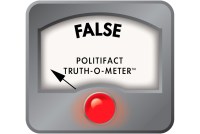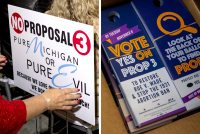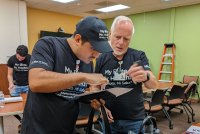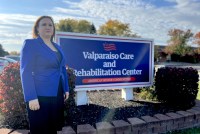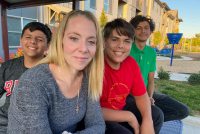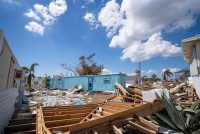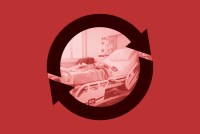Latest KFF Health News Stories
South Dakota Voters Approved Medicaid Expansion, but Implementation May Not Be Easy
South Dakotans voted to expand the state’s Medicaid program to cover thousands of additional low-income residents. But as other conservative states have shown, voter approval doesn’t always mean politicians and administrators will rush to implement the change.
El tema del aborto ayuda a los demócratas a minimizar pérdidas en estas elecciones
Entre otros problemas que enfrentaron los votantes el martes, los residentes de Dakota del Sur aprobaron una expansión de Medicaid bajo la Ley de Cuidado de Salud a Bajo Precio.
Abortion Issue Helps Limit Democrats’ Losses in Midterms
Although control of Congress was still undecided Wednesday, Republicans seemed poised to take power in the House, while the fate of the Senate remained too close to call. Economic issues were at the top of voters’ minds, but abortion access also played a large role in their decisions.
Ad Goes Too Far With Claim That Joe Biden Promotes Surgery for Trans Teens
Even some medical experts who are skeptical of gender-affirming care say the White House is not promoting breast removal and genital surgery for teens. But that’s not what an ad, funded by a group led by a former adviser to President Donald Trump, would have you believe.
Defense Department Health Plan Cuts Its Pharmacy Network by Nearly 15,000 Outlets
Many of the pharmacies were small, independent operations that had decided not to participate next year because of the lowered reimbursement being offered. But they were surprised by an early dismissal, and some patients with specialized drug needs could face difficulties in the transition.
Listen: With Abortion Rights on the Ballot in Michigan, Women Tell Their Stories
Women who need abortion care come to Michigan from surrounding states that already have banned the procedure. A clinic in suburban Detroit allowed a reporter to interview patients, doctors, and nurses to understand what is at stake as voters decide whether to guarantee abortion access in the Michigan Constitution.
Voluntarios electorales quieren que los latinos sepan que votar es bueno para su salud
En los últimos años, las instituciones de atención de salud a lo largo de todo Estados Unidos han realizado esfuerzos para promover el voto, inspiradas por la creciente creencia de que votar mejora la salud de las personas y las comunidades.
Post-‘Roe,’ Contraceptive Failures Carry Bigger Stakes
Science Friday and KHN ran the numbers on birth control failure. Depending on the contraception method, typical-use error rates can add up to hundreds of thousands of unplanned pregnancies each year.
Supreme Court to Hear Nursing Home Case That Could Affect Millions
An Indiana man’s family sued a state-owned nursing home for alleged mistreatment. A U.S. Supreme Court decision in the case could determine the right of many Americans to sue government agencies.
Election Canvassers Want Latinos to Know Voting Is Good for Their Health
One of the nation’s largest community clinic chains is running a get-out-the-vote campaign in Los Angeles and Orange counties this election, targeting primarily Latino communities, where turnout tends to be low.
Hospital Giant HCA Fends Off Accusations of Questionable Inpatient Admissions
The nation’s largest private health system, HCA Healthcare, has faced years of scrutiny over its share of emergency room patients who are admitted to the hospital. And now U.S. Rep. Bill Pascrell, a Democrat from New Jersey, is calling for a federal investigation, prompting an escalating defense by the hospital system, based in Nashville, Tennessee.
Centene Showers Politicians With Millions as It Courts Contracts and Settles Overbilling Allegations
Centene, the largest Medicaid managed-care company in the U.S., has thrown more than $26.9 million at political campaigns across the country since 2015, especially focused on states where it is wooing Medicaid contracts and settling accusations that it overbilled taxpayers. Among its tactics: Centene is skirting contribution limits by giving to candidates through its many subsidiaries.
California: propuesta de prohibición del tabaco aromatizado le abre paso a la pipa de agua
Ante la prohibición de cigarrillos electrónicos y mentolados, surge una polémica sobre los narguiles o pipas de agua.
Colorado Voters to Decide Whether All Schoolkids Get a Free Lunch
In September, a popular pandemic benefit expired: free school lunch for all children attending public schools. Some states are stepping up to try to keep the free food available, and it is on the ballot next week in Colorado.
California’s Proposed Flavored Tobacco Ban Gives Hookah a Pass
Californians will decide Nov. 8 whether to approve a statewide ban on the sale of flavored tobacco products, including menthol cigarettes. But the measure, known as Proposition 31, exempts hookah tobacco. Anti-smoking activists criticize the carve-out, calling it the latest example of businesses using identity politics to profit from a deadly product.
Hurricane Ian’s Deadly Impact on Florida Seniors Exposes Need for New Preparation Strategies
Lengthy checklists from public health officials on handling emergencies miss vulnerable seniors who can’t always follow the recommendations.
Cash for Colonoscopies: Colorado Tries to Lower Health Costs Through Incentives
State employees could receive checks ranging from $50 to thousands of dollars if they choose the right provider.
Hospital Investigated for Allegedly Denying an Emergency Abortion After Patient’s Water Broke
Federal officials have ordered the probe after reports that a woman whose water broke at 18 weeks could not get medical care recommended by her doctors to end the pregnancy because hospital officials were concerned about Missouri’s strict abortion law.
What Looks Like Pot, Acts Like Pot, but Is Legal Nearly Everywhere? Meet Hemp-Derived Delta-9 THC
The 2018 farm bill that legalized hemp created a loophole for an unregulated copycat of marijuana. A form of delta-9 THC — the psychoactive substance in pot — doesn’t face the same laws and regulations as marijuana because it comes from hemp. The drug is poised to upend the cannabis industry.
Medicare Fines for High Hospital Readmissions Drop, but Nearly 2,300 Facilities Are Still Penalized
Federal officials said they are penalizing 2,273 hospitals, the fewest since the fiscal year that ended in September 2014. Driving the decline was a change in the formula to compensate for the chaos caused by the covid-19 pandemic.





